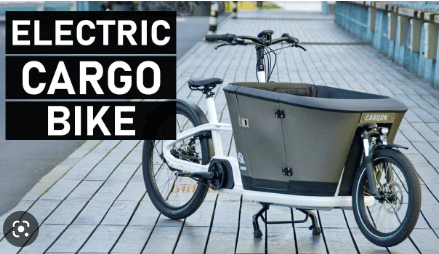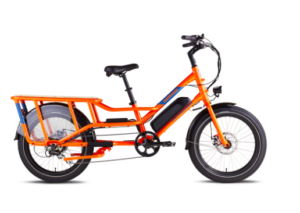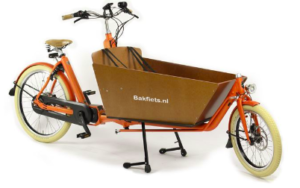
Pros and Cons of Cargo E-bikes.
What are the Pros of Cargo Electric bikes.
As a useful and environmentally friendly substitute for conventional automobiles and trucks for the transportation of products and packages, cargo e-bikes are gaining popularity. These bikes are perfect for a range of tasks, including commuting, doing errands, and business deliveries since they have spacious cargo decks and strong electric assist systems. We will go into great detail about the different benefits of cargo e-bikes in this post.
Cost-Effective:
The affordability of cargo e-bikes is one of their main benefits. Cargo e-bikes are substantially less expensive to buy and maintain than conventional automobiles and trucks. They are therefore a fantastic choice for anyone looking to reduce their transportation expenses. Additionally, compared to the price of fuelling a vehicle, the cost of charging an e-bike battery.
Eco-Friendly:
Compared to conventional cars, cargo e-bikes are a significantly greener solution. For individuals who care about the environment, they are the perfect option because they produce no emissions and have a very low carbon footprint. You may lessen the negative effects of carbon emissions on the environment by utilizing an e-bike for transportation.
Convenient:
The utilization of cargo e-bikes is highly handy. In comparison to conventional cars, they are simple to handle in traffic and take up significantly less parking space. For individuals who live in highly crowded locations and struggle with parking and traffic congestion, they are the perfect option. Cargo e-bikes may also save significant room in your home or garage because they are much simpler to store than conventional vehicles.
Health Advantages:
Using an electric cargo bike has several positive health effects. It is a low-impact kind of exercise that can assist strengthen the muscles, boost general fitness levels, and improve cardiovascular health. Cycling can also help lower stress and improve mental health.
Enhanced Effectiveness
Compared to conventional vehicles, cargo e-bikes are a lot more effective at moving items and parcels. They are the perfect option for business delivery in metropolitan locations since they can easily maneuver through traffic and confined places. Cargo e-bikes can also carry big loads, which makes them a great choice for moving supplies, food, and other items.
Customizable:
The ability to personalize freight e-bikes to meet your unique demands is another benefit. For instance, to enhance the quantity of goods you can carry, add panniers, baskets, and racks. If you want to increase the range of your e-bike, you can also change the battery. You can also install lighting to increase visibility and safety when riding at night.
Safe:
E-bikes for hauling cargo are significantly safer than conventional vehicles. They are significantly simpler to handle in confined places and have a lower center of gravity, making them less likely to go over. Furthermore, cargo e-bikes come with strong electric assist systems that may be used to easily climb hills and severe inclines.
In conclusion, cargo e-bikes are a great option for anyone looking to save money, lessen their carbon footprint, and improve their health since they provide several advantages over conventional cars.
A cargo e-bike could be the best option for you if you’re seeking for a more effective and practical method to move products and packages or just want a fun and environmentally responsible form of transportation.
What are the Cons of electric cargo bikes?

While cargo e-bikes provide numerous benefits, there are a few drawbacks to be aware of as well.
One or more of the main drawbacks is:
Range Restrictions:
The fact that cargo e-bikes have a restricted range, especially when compared to other types of transportation, is one of their main drawbacks.
The size of the battery determines an e-range, bike’s however the most of them can only go between 20 and 100 miles on a single charge.
For people who must travel over long miles while carrying big loads, this might be difficult.
Restrictive Load Capacity:
The low load capacity of cargo e-bikes is another drawback. Despite having a large cargo deck and the capacity to carry a certain amount of weight without endangering the bike, they are nonetheless constrained by these factors. For instance, some cargo e-bikes can only handle 100 pounds or less of weight.
Possibility of Theft:
Compared to other types of vehicles, cargo e-bikes are more likely to be stolen. They are simpler for criminals to steal and sell since they are smaller and more portable. Some freight e-bikes also come with pricey batteries and other parts that are highly sought-after by thieves.
Depending on the weather
Cargo e-bikes are weather-dependent and might be difficult to operate in bad weather. For instance, using an e-bike for transportation might be challenging or impossible when there is a lot of rain, snow, or ice. Furthermore, strong gusts might make it difficult to handle the bike, especially when it is loaded down.
Requirements for maintenance:
Cargo e-bikes need routine maintenance to stay in good working order. Cleaning the bike, tightening bolts and nuts, and replacing worn-out parts are a few examples of what falls under this category. E-bikes also come with batteries that must be charged on a regular basis and eventually replaced.
Cost:
Despite being less expensive than conventional cars, freight e-bikes may still be rather expensive to buy. An e-maintenance bike’s and upgrade costs might also pile up over time. This limits the number of people who can afford freight e-bikes.
In conclusion, there are a few drawbacks to cargo e-bikes that are important to take into account. While they have numerous advantages, such as affordability, environmental friendliness, and convenience, they also have certain drawbacks that must be considered. To decide if cargo e-bikes are the best option for you, it’s crucial to thoroughly consider the Pros and Cons of Cargo E-bike models.
FAQs,
How much weight can an electric cargo bike carry in total?

The maximum weight that a cargo electric bike can transport is determined by a number of elements, such as the bike’s size and design, battery size, and frame and component strength. Typically, the weight capacity of cargo e-bikes is between 100 and 400 pounds.
It’s crucial to remember that an e-performance bike’s may be impacted by carrying a high load, including its range and maneuverability. Additionally, overloading an e-bike might limit its lifespan and harm its components.
The maximum weight you will need to transport should be taken into account when purchasing a cargo e-bike, and the bike should be able to handle that weight. To make sure your load can be carried securely and comfortably, you need also take into account other elements, such as the size and design of the cargo deck, the placement of the goods, and the stability of the bike.
Who should use a cargo bike?

Depending on the particular type and design of the bike, cargo bikes are appropriate for a wide range of ages. While some cargo bikes are made expressly to carry children, others are made to carry stuff or be used by adults.
Many cargo bikes come with a front-loading design with a roomy, safe luggage space that can hold one or two kids for hauling youngsters. To provide a comfortable and secure ride for kids, some models additionally have extra amenities like adjustable seats and footrests. Children as young as one year old may usually ride these kinds of cargo bikes.
There are several different types of cargo bikes available for adult riders, from smaller versions made for commuting and doing errands to bigger ones made for heavy-duty freight hauling. As long as they are physically capable of riding a bike, these kinds of cargo bikes are normally appropriate for adult riders of all ages.
It’s vital to remember that the precise age range for cargo bikes might change based on the bike’s design, regional laws, and the physical condition of the user. It is advised to thoroughly analyze your individual demands before making a cargo bike purchase and to test drive various models to see which is the best choice for you.
What is the difference between an e-bike and an e-cargo bike?
A bicycle with an electric motor and a battery is known as a “ebike” or “electric bike.” The electric motor assists the cyclist, making it simpler for them to pedal and enabling them to go further with less effort.
On the other side, an electric bike known as a “e-cargo bike” is one that is made expressly for hauling freight. Compared to ordinary ebikes, e-cargo bikes often feature a bigger cargo space and are made to carry greater loads like groceries, parcels, and even kids. They frequently have a strong electric motor and a bigger battery, which enables them to move heavy objects farther with less effort.
In conclusion, the fundamental distinction between an ebike and an e-cargo bike is how they are made and what they are used for. While e-cargo bikes are made for carrying goods and are best for moving large loads like groceries and parcels or for moving children, e-bikes are made for individual riders and are appropriate for commuting, leisure riding, and running errands.
Are cargo ebikes worth it?

The value of cargo e-bikes varies on a variety of variables, including the user’s unique demands, the type of cargo e-bike under consideration, and the planned application.
When moving a lot of heavy objects or covering short distances in a congested metropolis, cargo e-bikes may be a practical and effective means of moving equipment and merchandise. In particular, if you want to lessen your carbon footprint and save money on petrol, they might be a terrific substitute for driving a car.
However, compared to conventional cycles, cargo e-bikes can be more expensive, and the price of the battery and engine can mount up rapidly. Additionally, they might be more difficult to store and transport because they are often heavier and bulkier than conventional bikes.
In the end, whether an electric cargo bike is worthwhile will depend on your individual demands, your financial situation, and the sort of riding you want to perform. Before selecting a choice, it’s a good idea to think about your intended purpose, your budget, and the characteristics that are most essential to you.
How far can a cargo electric bike travel?
The size and power of the battery, the weight of the bike and the luggage, as well as the surface and riding conditions, all affect a cargo e-range. bike’s
The typical range of cargo e-bikes is 20–60 miles (32–97 km) per charge, however there is a broad variety depending on the aforementioned variables. While lesser affordable versions may only have a range of 10 to 20 miles, some high-end cargo e-bikes can have a range of up to 100 miles (160 km) or more (16-32 km).
It’s crucial to remember that the estimated range of an e-bike can be considerably impacted by real-world circumstances like carrying a lot of weight, riding over steep terrain, and facing strong headwinds. It’s advisable to go to the manufacturer’s specs or read reviews from other users who have used the bike in comparable circumstances to get a more precise idea of the range you may anticipate from a given cargo e-bike.
What range of prices can you expect for electric cargo bikes?
Electric cargo bike prices can vary significantly based on the model and quality of the bike.
Mid-range versions can cost between $3,000 and $6,000, while more affordable variants can vary from $1,000 to $3,000. Some versions of high-end cargo e-bikes can cost up to $10,000 or more, with prices ranging from $6,000 to more.
A cargo e-cost bike’s is influenced by a number of elements, such as the components’ quality, the battery’s size and power, the motor system, and the extra features and extras the bike comes with.
It’s crucial to remember that a more expensive e-bike does not necessarily equal a better one, so you should carefully assess your demands and budget before making a purchase. A cargo e-bike that delivers a decent combination of functionality and quality for your price is often a solid choice.
Related post








